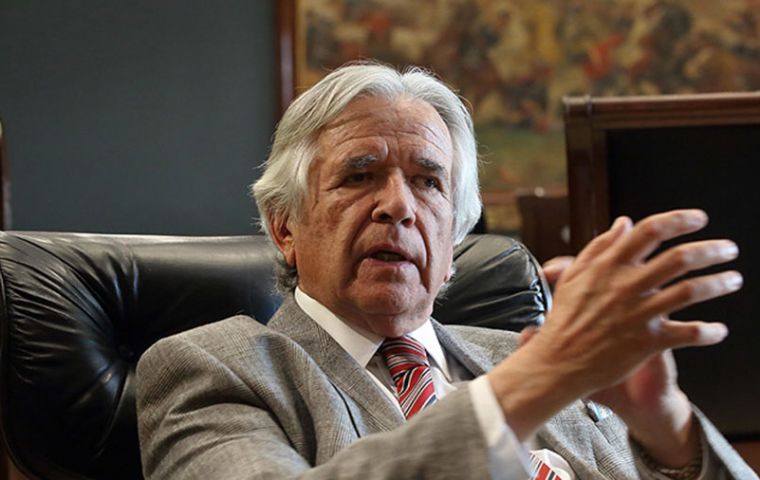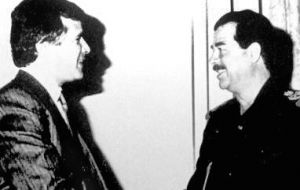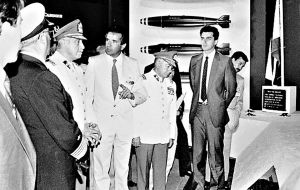MercoPress. South Atlantic News Agency
US Justice has requested Chile the arrest of arms and bombs manufacturer tycoon
 Carlos Cardoen is accused of illegally importing the bomb-making element zirconium from the US, which added a potent incendiary effect to cluster bombs
Carlos Cardoen is accused of illegally importing the bomb-making element zirconium from the US, which added a potent incendiary effect to cluster bombs  Cardoen Industries, sold to Saddam Hussein's Iraqi regime in the 1980s and 1990s, allegedly with full knowledge and acceptance of the United States
Cardoen Industries, sold to Saddam Hussein's Iraqi regime in the 1980s and 1990s, allegedly with full knowledge and acceptance of the United States  Under General Pinochet, Chile was unable to import arms due to an international embargo, developing Chile's private arms industry became of key importance
Under General Pinochet, Chile was unable to import arms due to an international embargo, developing Chile's private arms industry became of key importance For 26 years, Chilean business tycoon Carlos Cardoen has been unable to travel abroad for fear of arrest. Cardoen is accused of illegally importing the bomb-making element zirconium from the US, which added a potent incendiary effect to cluster bombs his company, Cardoen Industries, sold to Saddam Hussein's Iraqi regime in the 1980s and 1990s.
In 1993, Interpol issued an international arrest warrant for Cardoen at the behest of the United States in connection with the charges. But it was only on 22 March of this year that the US Department of Justice finally filed a formal request for the 77-year-old businessman to be detained.
Chile's Supreme Court has ordered that he be held under house arrest, giving the US 60 days to formalize the extradition. Cardoen insists that the bombs were sold to Iraq with the full knowledge and acceptance of the US, and his lawyers are fighting the extradition request.
Since the Interpol “red notice” was issued, Cardoen has channeled his time and considerable wealth into promoting his home region in the Colchagua valley and preserving the cultures of Chile's native peoples.
The latter has won him sweeping acclaim and saw him decorated with the Gabriela Mistral Order of Educational and Cultural Merit in 2005. Announcing Cardoen as the winner, the then-education minister, Sergio Bitar, said that “nobody on Earth is an angel”.
Carlos Cardoen has put his home town of Santa Cruz “on the map”, according to his son Andrés, who runs the family's foundation. “My father's museum has driven interest in the region,” he says of Cardoen's private collection of artifacts, one of the largest in South America.
Among the items on display in Cardoen's Colchagua Museum is the original document drawn up at the first meeting of Chile's government in 1810.
It also boasts one of the largest collections of indigenous Mapuche jewelery and an extensive audiovisual tribute to the 33 Chilean miners who were trapped underground for 69 days in 2010 and their rescuers.
“My father is not the type of collector whose possessions are contained by four walls. He wants to share, that is his passion,” explains Andrés Cardoen.
A short drive along the valley is what Luís Navarra at the Santa Cruz tourist office describes as “the ”Disneyworld of wine“. Sprawling across more than one million hectares, Cardoen's vineyard, Viña Santa Cruz, is the epicenter of his efforts to add winemaking to the area's attractions.
A cable car takes tourists up to a plateau above Cardoen's automobile museum, where one of the four DeLoreans modified for the 1985 film Back to the Future is on display alongside an array of classic cars.
While many Chileans appreciate Cardoen's efforts to share his treasures with the people of Santa Cruz, his pioneering role in Chile's private arms industry has long been contentious.
Daniel Prieto, a defense analyst and lecturer in global politics who worked with Cardoen until 1985, says that Cardoen Industries had been developing weapons for defensive purposes since the late 1970s while tensions with neighboring Argentina were running high.
During the rule of Gen Augusto Pinochet, Chile was unable to import arms due to an international embargo and with the two neighbors at the brink of war in 1978, developing Chile's private arms industry became of key importance.
”[The weapons] were manufactured to defend Chile,“ Mr Prieto says. ”But when the Falklands War broke out [in 1982 between Argentina and the UK], the Argentine threat dissipated.“
Mr Prieto says there was much discussion as to what Cardoen Industries should do with its arms technology. Eventually, it was decided that foreign markets would be sought for the hardware.
One of those foreign markets was Iraq. Cardoen insists that the bombs his company manufactured for use in Iraq from 1982 until 1991 were sold with the full knowledge and acceptance of the US. But when Saddam Hussein invaded Kuwait in August 1990 catalyzing a US-led counter offensive, the US position shifted, Mr Prieto says.
”By then I had left Cardoen Industries, but I could see from the outside how the US attitude towards Carlos had changed, and they bombed two manufacturing plants he had in Iraq.“
The US also confiscated properties owned by Cardoen in Miami. It is not clear why the US did not request Cardoen's extradition at the same time as it asked Interpol to issue the international arrest warrant, but the long delay has not gone unnoticed.
”[The US] has demanded [Mr Cardoen's] detention with a view to extradition almost 26 years after the initial indictment was made,“ Cardoen's lawyer, Joanna Heskia, says.
”It is a request based on crimes that do not exist in Chile and thus cannot be prosecuted,” she argues. But US officials are adamant that Carlos Cardoen should stand trial in the US for allegedly breaking custom rules by falsely stating that the zirconium his company imported was for civilian, not military use.




Top Comments
Disclaimer & comment rulesCommenting for this story is now closed.
If you have a Facebook account, become a fan and comment on our Facebook Page!